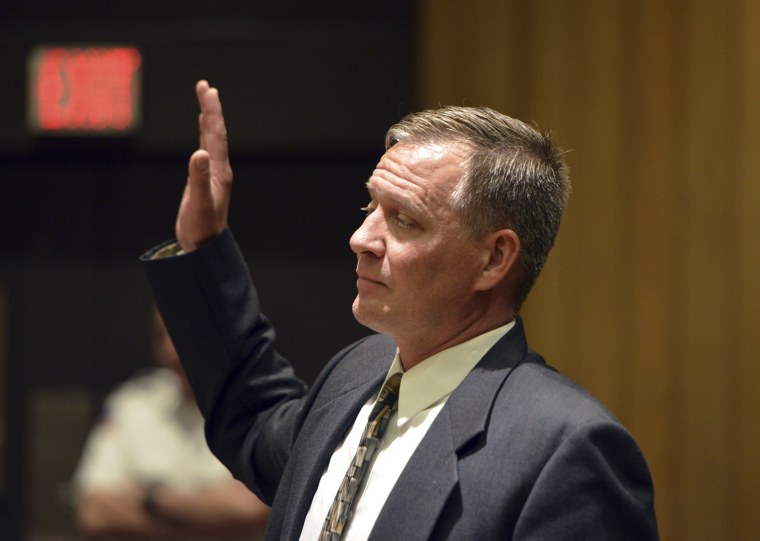WASHINGTON — During the Trump administration the Justice Department has all but abandoned broad civil rights investigations into police forces, a tool used 25 times under the Obama administration to bring cultural change to local departments.
A Justice Department official tells NBC News the one such probe opened under Trump remains ongoing for a third year without results to show. It was meant to examine, and possibly change, practices at the Springfield, Mass., department, where officers allegedly used excessive force and racist language and kept beer in a vending machine at headquarters. The status of the investigation was not previously known.
The Justice Department's Civil Rights Division's special litigation section opened the "pattern or practice" investigation in April 2018, according to Springfield officials.
Typically, such an investigation would include bringing in policing experts and interviewing a wide swath of local stakeholders who paint a picture of the department's culture and its relationship to the community. The Justice Department would release its findings and make recommendations, often including the placement of an independent monitor for a period of time, and the two sides would negotiate until a consent decree is agreed upon and imposed by a judge.
In a consent degree, a department typically agrees to change certain practices. In March 2016, the Obama Justice Department entered into a consent decree with the City of Ferguson, Missouri. The document outlined in 133 pages the problems and proposed solutions that Ferguson would agree to implement following the August 2014 shooting of 18-year-old Michael Brown, an unarmed Black man, by a white officer. Included in the agreement were new policies on use-of-force and strategies for "bias-free policing."
The Springfield investigation has yielded no such result. According to local officials, the probe focused primarily on the department's narcotics division where two officers, Gregg Bigda and Steven Vigneault were charged with using unreasonable force against Latino minors.
According to the indictment, Bigda kicked one of the minors, spat on him and said “welcome to the white man’s world” during an interrogation conducted outside the presence of the minor's parents. Bigda was also caught on camera threatening to plant drugs as evidence on the teens, who had stolen a running, unmarked police car belonging to Vigneault.
In the course of the federal investigation, several Springfield officers revealed to a grand jury that officers drank alcohol at the police station and had knowledge of a vending machine where soda had been replaced with beer.
One of the minors harmed in the incident sued Bigda, other officers and the City of Springfield in a federal lawsuit filed June 10. In it, the plaintiff, who goes by D.R. to protect his identity as a minor, said he heard his friend scream that the police dog was "going to kill me." The friend was taken to a hospital to be treated for dog bite wounds while D.R. and another minor suspect were taken to the police station for interrogation.
In the lawsuit against Bigda, D.R. said he could smell an "overwhelming odor" of alcohol on Bigda's breath during the interrogation.
D.R.'s attorney said in the lawsuit that Bigda had 26 civilian complaints and six other Springfield narcotics officers had 95 complaints between them that were all determined to be unfounded by the police department.
The narcotics unit has since been folded into the Springfield Police Department’s strategic impact unit.
Springfield Police spokesman Ryan Walsh said the department continues to communicate with the Justice Department on the pattern or practice investigation. Walsh said the police department is awaiting the outcome of the case against Bigda. Charges against Vigneault have been dismissed, and he has pending litigation against the department. Bigda's lawyer declined to comment.
But questions surrounding Springfield’s culture and whether there is a pattern or practice that systematically violates civil rights remain open.
Two former Civil Rights Division attorneys told NBC News that pattern or practice investigations typically conclude in less time than the Justice Department is currently taking to report its findings on Springfield. For example, a deep investigation into the Chicago Police Department took one year and involved interviews with 340 members of the force, according to a Washington Post op-ed by Chiraag Bains, an attorney who worked on the probe.
Shortly before leaving office, Attorney General Jeff Sessions raised the bar on what it would take to enter into a consent decree, an agreement between the Justice Department and the local police that is overseen by a judge and often includes an independent monitor.
“This supervision can deprive the elected representatives of the people of the affected jurisdiction of control of their government,” Sessions argued, and urged the DOJ to exercise “special caution” before entering into a consent decree.
Lynda Garcia, a former trial attorney at the Justice Department who oversaw pattern or practice investigations under the Obama administration, said a “pro-police” culture has weakened the section.
“I would emphasize how vulnerable this line of work is because every administration has their priorities,” said Garcia, who is now the policing campaign director at the Leadership Conference on Civil and Human Rights.

